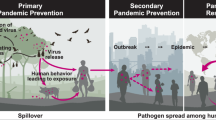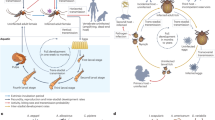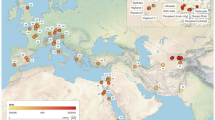A humane method to control elephant populations without behavioural side effects.
Abstract
Concerted efforts to nurture elephant populations have resulted in elephant overpopulation in several areas, which in turn has led to damaging levels of browsing. As an alternative to culling entire family groups in order to control this damage, we have developed an immunocontraceptive vaccine from pig zona pellucida which safely and successfully controls free-roaming African elephants.
Similar content being viewed by others
Main
Immunocontraceptive vaccines cause the immune system to produce antibodies that prevent fertilization, without the side effects of hormonal contraceptives. The vaccine antigens are the proteins of the zona pellucida, the clear protein coat surrounding mammalian eggs. The surface structures of the elephant zona pellucida are very similar to those of the pig zona pellucida (pZP)1,2,3.
Female zoo elephants vaccinated with pZP and an adjuvant all developed antibodies that persisted for 12–14 months1,2, at a level equivalent to those found in horses given immunocontraception4,5. Based on this, we planned field trials in Kruger National Park, in conjunction with the South African National Parks.
Initial trials using 41 adult female elephants tested the efficacy of pZP as an immunocontraceptive. Elephants were located from a helicopter, and females to be anaesthetized (by aerial darting) were identified as non-pregnant by the presence of a calf smaller than 1 metre high. We then used ultrasound scans to confirm that females were not pregnant, and all non-pregnant animals were bled to obtain pre-vaccination serum samples. Twenty-one elephants were given an initial vaccination of pZP with adjuvant; 20 controls received a placebo.
All treated elephants were fitted with radiocollars. The control females were fitted with numbered collars and paired in a family unit with a vaccinated elephant. The vaccinated elephants were located 6 weeks later and received a first booster, followed by another 6 months later. Both boosters were administered remotely with drop-out darts from a helicopter.
Twelve months after the initial vaccination, the elephants were recaptured and scanned for pregnancy. Of those treated with pZP, 19 were recaptured (two were not found because their radiocollars failed). Nine of the 19 were pregnant, ten were not. One of the pregnant elephants was in the last trimester of gestation (22 months) and gave birth to a healthy calf, showing that the vaccination of a pregnant elephant with pZP has no effect on gestation, the fetus or parturition. Eighteen of the 20 control elephants were located, 16 of which were pregnant. Therefore, significantly (χ2, P=0.005) fewer vaccinated elephants (44%, 8/18) were pregnant than the control females (89%, 16/18).
Subsequently, we vaccinated ten elephants using a revised schedule. Females received an initial vaccination, followed by identical boosters delivered from a helicopter two and four weeks later. All elephants were fitted with radiocollars; five had global positioning satellite (GPS) collars (Lotek, Newmarket, Canada) which recorded their location hourly.
Of the ten elephants, two (20%) were pregnant after 10 months. This was significantly (χ2, P=0.001) lower than the conception rate of the control elephants (89%, 16/18) and initial immunocontraception rates (44%, 8/18).
Female elephants with oestradiol implants have shown aberrant behaviour by separating off within the family unit (D.G., personal observation). GPS-collar location data indicated that there was no abnormal separation of the vaccinated females within a family unit over 8 months. This, combined with field observations of vaccinated females, suggests that the immunocontraceptive vaccine causes no behavioural abnormalities.
Finally, we tested the reversibility of immunocontraception, and its application for a second consecutive year. Of seven elephants from the group that had initially received immunocontraception, four were vaccinated with pZP and adjuvant, and three were not. Twelve months later, the seven elephants were captured and re-evaluated. Ultrasound scans showed that all three untreated females had conceived again, compared with none of the vaccinated elephants, although all were cycling. This indicates that the vaccine is reversible, and that it has no deleterious effect on the ovary and its cyclicity.
Elephants are intelligent and empathetic mammals, and culling is a last resort in controlling their numbers. Our immunocontraceptive study shows that free-roaming African elephants vaccinated with pZP are protected against conception. This pZP immunocontraception is safe and reversible and is thus a practical tool for controlling elephant populations.
References
Fayrer-Hosken, R. A. et al. Theriogenology 47, 397 (1997).
Fayrer-Hosken, R. A. et al. Theriogenology 52, 835– 846 (1999).
Fayrer-Hosken, R. A., Bertschinger, H. J., Kirkpatrick, J. F., Turner, J. W. & Liu, I. K. M. Bulletin 25, 18–21 (1997).
Willis, L. P., Heusner, G. L., Warren, R. J., Kessler, D. & Fayrer-Hosken, R. A. J. Eq. Vet. Sci. 14, 364–370 (1994).
Kirkpatrick, J. F., Turner, J. W. Jr, L iu, I. K., Fayrer-Hosken, R. & Rutberg, A. T. Reprod. Fertil. Dev. 9, 105–110 (1997).
Author information
Authors and Affiliations
Corresponding author
Rights and permissions
About this article
Cite this article
Fayrer-Hosken, R., Grobler, D., Van Altena, J. et al. Immunocontraception of African elephants. Nature 407, 149 (2000). https://doi.org/10.1038/35025136
Issue Date:
DOI: https://doi.org/10.1038/35025136
This article is cited by
-
Infertility and Immunocontraception based on zona pellucida
Reproductive Medicine and Biology (2014)
-
Vaccines for immunological control of fertility
Reproductive Medicine and Biology (2010)
-
African elephants and contraception
Nature (2001)
-
Jumbo stopper
Nature (2000)
Comments
By submitting a comment you agree to abide by our Terms and Community Guidelines. If you find something abusive or that does not comply with our terms or guidelines please flag it as inappropriate.



